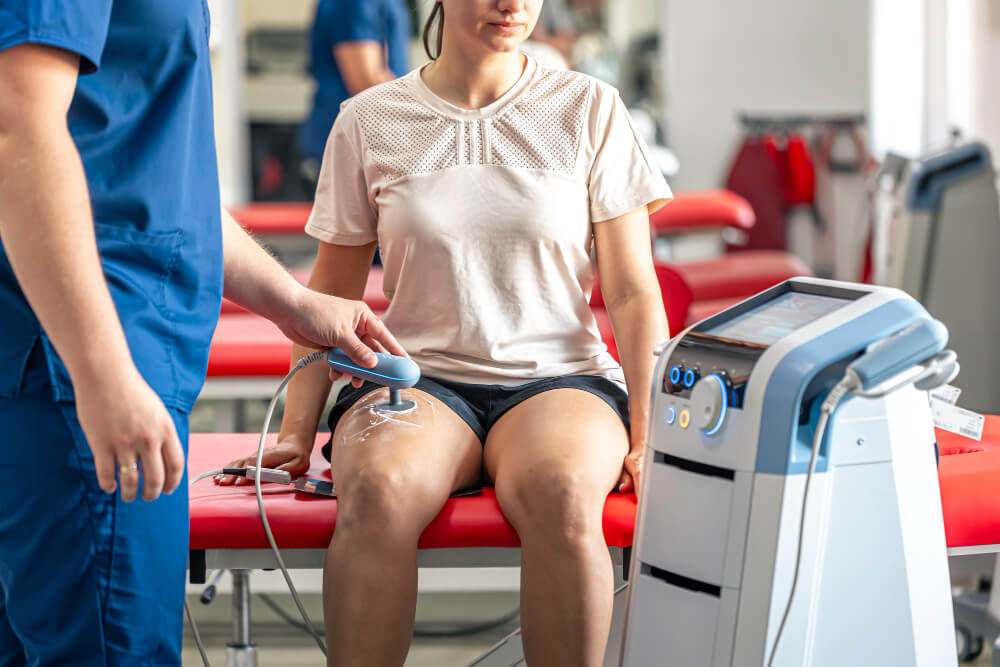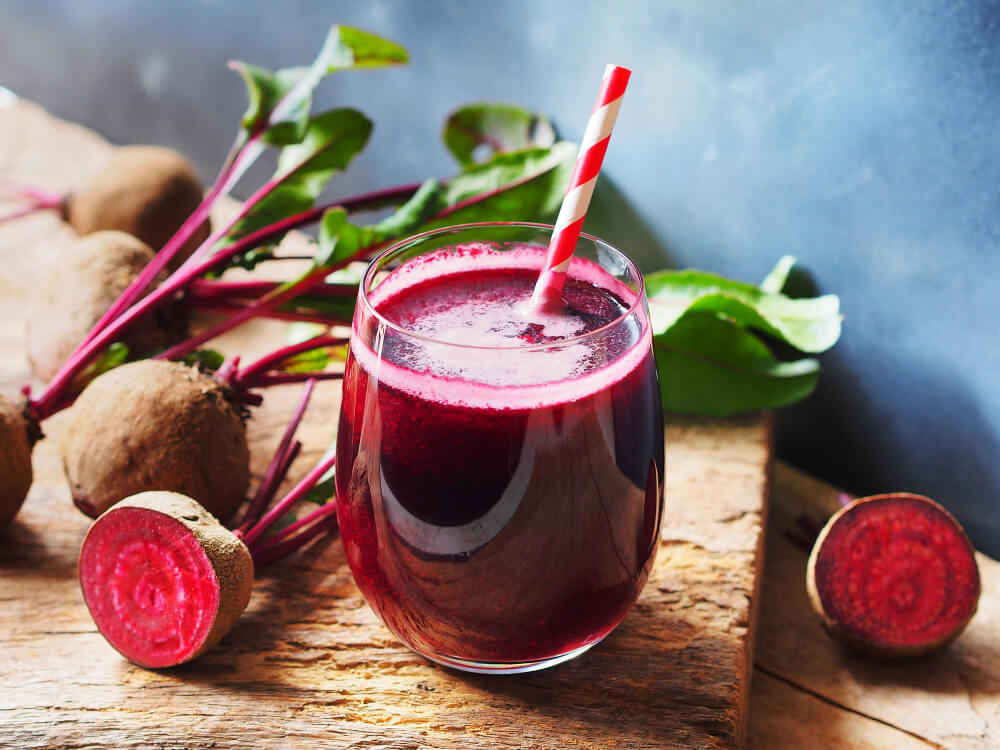Is there anything this juice doesn’t do? Let’s look at seven ways it can help your health.
Beetroot juice has become a popular addition to many health-conscious individuals’ diets due to its numerous health benefits and potential improvement in athletic recovery. Packed with essential nutrients, antioxidants, and nitrates, beetroot juice offers a unique nutritional profile and supports an array of physiological functions that contribute to overall well-being.
In recent years, research has shown the potential of beetroot juice in enhancing exercise performance, supporting brain health, and promoting good digestion. Additionally, beetroot juice helps regulate blood pressure, reduce inflammation and pain, and provide detoxification support, making it an ideal supplement for those seeking to improve their health and exercise recovery.
Nutritional Profile of Beetroot Juice
The nutritional profile of beetroot juice is impressive, providing a wide variety of vitamins, minerals, phytonutrients, and antioxidants essential for maintaining good health and supporting exercise recovery. In this section, we will examine the vitamins and minerals phytonutrients and antioxidants found in beetroot juice.
Vitamins and Minerals
Beetroot juice is a rich source of several essential vitamins and minerals. Some of the key vitamins and minerals present in beetroot juice include:
- Vitamin C: Supports the immune system, aids in iron absorption, and acts as a powerful antioxidant.
- Potassium: Helps maintain blood pressure, improves nerve function, and regulates muscle contractions, including the heart.
- Manganese: Necessary for proper bone development, enzyme activation, and blood sugar control.
- Folate (Vitamin B9): Vital for DNA synthesis, red blood cell formation, and proper brain function.
- Magnesium: Supports muscle and nerve function, maintains bone health, and regulates blood sugar levels.
Phytonutrients and Antioxidants
In addition to its vitamins and minerals, beetroot juice also contains a variety of phytonutrients and antioxidants that play critical roles in supporting overall health and exercise recovery. These include:
- Betalains: A class of pigments responsible for the vibrant red-purple colour of beets, betalains have been shown to possess potent antioxidant and anti-inflammatory properties.
- Nitrates: Beetroot juice is rich in nitrates, which convert to nitric oxide in the body. Nitric oxide helps improve blood flow and oxygen delivery to muscles during exercise, leading to better exercise performance and recovery.
- Polyphenols: These are plant-based antioxidants that help neutralize free radicals, protect against oxidative stress, and reduce inflammation, as demonstrated in a study on muscle damage and recovery.
To conclude, beetroot juice provides a unique nutritional profile that includes essential vitamins, minerals, phytonutrients, and antioxidants, making it a beneficial addition to the diets of athletes and individuals seeking to improve overall health and exercise recovery.

One: Enhancing Athletic Performance
Beetroot juice has gained popularity among athletes and fitness enthusiasts for its potential to improve various aspects of physical performance. In this section, we will explore how beetroot juice can enhance athletic performance by improving endurance and reducing muscle fatigue.
Improving Endurance
Beetroot juice has been found to increase time to exhaustion in some studies. The nitrate content in beetroot juice is converted into nitric oxide (NO) in the body, which helps to improve blood flow and oxygen delivery to the muscles during exercise. This increased blood flow can result in longer-lasting energy, reduced perceived effort, and ultimately improved endurance.
Some key findings on beetroot juice and endurance include:
- Greater time to exhaustion in a cycling test in some individuals1.
- Faster finish times in running and cycling events 2.
Reducing Muscle Fatigue
Another advantage of beetroot juice supplementation is its potential to accelerate recovery following intense exercise. The increased nitric oxide production from beetroot juice consumption may reduce muscle inflammation and soreness, promoting faster recovery.
Furthermore, beetroot juice has been shown to improve performance recovery after exercise-induced muscle damage in female volleyball players. This suggests that incorporating beetroot juice into an athlete’s diet may help to optimize performance and support muscle recovery during training or competition periods.
To summarize, beetroot juice may provide benefits for athletes by:
- Enhancing endurance through improved blood flow and oxygen delivery to muscles.
- Reducing muscle fatigue by promoting faster recovery and reduced inflammation.
In conclusion, incorporating beetroot juice into an athlete’s diet may improve performance and recovery. While more research is needed to understand the extent of these benefits fully, the existing evidence shows promising results for those looking to enhance their athletic potential.
Footnotes
- Influence of beetroot juice supplementation on intermittent exercise performance↩
- Beetroot juice and exercise performance↩

Two: Blood Pressure Regulation
Beetroot juice has been recognized for its potential role in regulating blood pressure, particularly for individuals with hypertension. One major factor contributing to this health benefit is the nitrate content found in beetroot.
Nitrate Content and Vasodilation
Beetroot juice is an excellent source of dietary nitrates, which our body converts into nitric oxide (NO). Nitric oxide plays a vital role in vasodilation, relaxing blood vessels and increasing blood flow. This allows for a more efficient delivery of oxygen and nutrients to muscles during exercise and aids in recovery.
Research has shown that beetroot juice ingestion has enhanced cardiovascular responses for postmenopausal women with arterial hypertension. Moreover, a proof-of-concept study suggests that beetroot juice has the potential to reduce blood pressure and improve overall blood pressure regulation by increasing NO bioavailability.
It is important to note that the effects of beetroot juice on blood pressure may vary among individuals, and further research is needed to draw more definitive conclusions.

Three: Inflammation and Pain Reduction
Beetroot juice has been shown to have potential benefits in reducing inflammation and pain, particularly after intensive exercise. The anti-inflammatory properties of beetroot juice can be mainly attributed to its high nitrate content, which has been linked to improved blood flow and reduced inflammation in muscles 1.
A study investigating the effect of beetroot juice supplementation on muscle soreness and performance recovery after exercise-induced muscle damage found that it may play a role in regenerating damaged skeletal muscles. This is thought to be due to increased nitric oxide levels, leading to reduced muscle damage caused by inflammatory cells.
Another research examined the effects of beetroot juice on indices of muscle damage following eccentric exercise. The study found that a short-term supplementation of beetroot juice might aid recovery. However, further research is needed to establish the optimal dosage and duration of supplementation for maximum benefits.
It is also worth noting that beetroot juice has been found to help recover muscle function and performance between bouts of repeated sprint exercises. This could be especially beneficial for athletes and individuals who engage in high-intensity training.
In summary, beetroot juice has shown promise in reducing exercise-induced inflammation and pain. More research is required to determine the optimal dosage and supplementation period. However, incorporating beetroot juice into a balanced diet may provide valuable support for those aiming to improve their exercise recovery and overall performance.
Footnotes

Four: Detoxification Support
Beetroot juice has been found to support the body’s natural detoxification process due to its high levels of phytochemicals and antioxidants. These compounds help neutralize harmful toxins and promote their elimination from the body. The beetroot’s impact on detoxifying enzymes such as glutathione S-transferase (GST) and NAD(P)H oxidoreductase 1 (NQO1) has been well-documented in various studies. These enzymes are crucial in neutralizing and eliminating harmful compounds from the body.
One of the key components of beetroot juice that assists in detoxification is betalains. They are a class of natural pigments responsible for the red and yellow colors in beetroots. Betalains are known for their potent antioxidant, anti-inflammatory, and detoxifying properties. They help protect the body from oxidative stress and facilitate the removal of harmful byproducts generated during intense exercise or exposure to environmental toxins.
In addition to betalains, beetroot juice is rich in dietary nitrates. These compounds are converted in the body to nitric oxide, which has multiple physiological effects. Nitric oxide supports detoxification by improving blood flow and assisting the liver in flushing out toxins effectively.
Here are some benefits of beetroot juice for detoxification support:
- Boosts levels of detoxifying enzymes like GST and NQO1
- Provides antioxidants, such as betalains, to neutralize harmful toxins
- Improves circulation and liver function through nitric oxide production
In conclusion, incorporating beetroot juice into your diet can support the body’s natural detoxification process. Its rich content of phytochemicals, antioxidants, and nitrates work together to promote the efficient removal of potentially harmful compounds. This detoxification support may benefit overall health and aid in exercise recovery by helping reduce muscle damage and inflammation resulting from strenuous activity.

Five: Improving Digestive Health
Beetroot juice has numerous health benefits, including improving digestive health. High in fibre, beetroot juice promotes regular bowel movements and prevents constipation. The soluble fibre found in beetroot helps soften stool, making it easier to pass through the digestive tract, while the insoluble fibre adds bulk and helps speed up digestion.
In addition to its fibre content, beetroot juice contains betaine, a compound responsible for promoting gut health. Betaine increases stomach acid production, which aids in breaking down food and absorbing essential nutrients. Furthermore, betaine has been shown to have protective effects on the gut lining, reducing inflammation and maintaining the integrity of the digestive tract.
Beetroot juice also contains nitrates, converted into nitric oxide in the body. Nitric oxide is crucial in improving blood flow to the digestive organs, ensuring efficient delivery of nutrients and oxygen. An increased nitric oxide production may also help to reduce bloating and discomfort during digestion.
Incorporating beetroot juice into your diet can be a simple yet effective way to support your digestive health. Consider adding it to smoothies, drinking it straight or blending it with other nutritious fruits and vegetables to reap its benefits.
Note: Always consult with a healthcare professional before making significant changes to your diet, especially if you have pre-existing health conditions.

Six: Supporting Brain Health
Beetroot juice is known for its positive impact on brain health. Rich in nitrates can significantly improve cognitive function and support overall brain function. One of the key benefits of beetroot juice is its ability to aid in producing nitric oxide. Nitric oxide helps increase blood flow to the brain and enhances oxygenation, which subsequently contributes to better cognitive functions. 1.
Regular consumption of beetroot juice has been linked to improved neuron communication and prevention of age-related cognitive decline. A study found that beetroot juice consumption promotes better brain plasticity 2. This means the brain can adapt to new situations and stimuli more efficiently, helping it stay sharp and alert.
The effect of beetroot juice on exercise recovery is also closely tied to its impact on brain health. The brain needs an ample supply of oxygen and nutrients during intense workouts to function optimally. Beetroot juice helps provide these vital elements, improving mental performance during and after exercise sessions. Its effects on cognitive function were observed in a pilot study on trained male taekwondo athletes, where beetroot juice supplementation seemed to enhance cerebral oxygenation 3.
Footnotes
- Beetroot juice: an ergogenic aid for exercise and the aging brain↩
- The potential benefits of red beetroot supplementation in health and disease↩
- Effects of beetroot juice supplementation on cognitive function, aerobic and anaerobic performances of trained male taekwondo athletes: A Pilot Study↩

Whipped Feta & Beet Toast with Poached Egg
Ingredients
What you need
For the dukkah
- ½ cup hazelnuts
- 2 tbsp. pistachios
- ¼ tsp fennel seeds
- ½ tsp ground coriander
- ½ tsp ground cumin
- ¼ tsp sea salt
For the toast
- 1 cup feta cheese crumbled
- 4 tbsp natural yogurt
- ½ lemon juiced
- 2 tbsp water
- salt & pepper
- 1 tbsp olive oil
- 250 g pack cooked beetroot cut into wedges
- 4 eggs
- 4 slices bread toasted
- 2 tbsp dukkah
- 2 tbsp parsley chopped
Instructions
What you need to do
- To make the dukkah,start by toasting the hazelnuts and pistachios in a dry pan over a medium heatfor 3-4 minutes. Add the sesame and fennel seeds, and toast for a furtherminute.Transfer everything to a food processor and add the remainingingredients and pulse until well combined and chopped together.
- To make the whipped feta, place thefeta cheese, yogurt, lemon juice and cold water into a small food processor,season with salt and pepper and blitz until smooth.
- Next, heat the olive oil in a potover a medium/high heat. Add the beetroot and cook for 5 minutes on each sideor until the beetroot is lightly caramelized.
- Now poach the eggs using yourpreferred method.
- Toast the bread, then spread withthe whipped feta and top with the beetroot wedges. Place the poached eggs ontop, sprinkle with the dukkah and fresh parsley and serve immediately.
Notes
- Calories: 355
- Fat: 22g
- Carbs: 23g
- Protein: 17g
- Fibre: 2g
- Vegetarian
- Quick to make
Contains nuts
Nutrition
Frequently Asked Questions
What are the potential side effects of consuming beetroot juice?
Beetroot juice is generally safe for consumption but may cause some side effects, such as gastrointestinal discomfort and temporary discolouration of urine and stools, called beeturia. It is essential to moderate beetroot juice intake and consult a healthcare professional if side effects persist or worsen.
How does beetroot juice specifically benefit males?
Beetroot juice may be particularly beneficial for males in enhancing exercise performance, increasing nitric oxide production. Nitric oxide helps improve blood flow and oxygen delivery to tissues and muscles, boosting performance and recovery during exercise. Additionally, beetroot juice has been found to improve high-intensity intermittent exercise performance in trained athletes.
What is the recommended wait time to experience the effects of beetroot juice?
The effects of beetroot juice may vary for each individual and depend on factors such as dosage and individual metabolism. Generally, it takes approximately 2-3 hours for beetroot juice to be absorbed and peak in plasma nitrate levels. To maximize the benefits, consuming beetroot juice 2-3 hours before exercise is usually suggested.
In what ways can females benefit from the intake of beetroot juice?
Females can benefit from beetroot juice in various ways, including improved cardiovascular health, antioxidant support, and exercise performance. Like males, females may experience enhanced exercise performance and recovery by consuming beetroot juice, which has been demonstrated to improve repeated sprint performance.
When is the ideal day to consume beetroot juice for optimal benefits?
The ideal time for consuming beetroot juice depends on individual goals and lifestyles. If the primary goal is to maximize exercise performance and recovery, consuming beetroot juice 2-3 hours before a workout session is generally suggested. It can be consumed at any time of the day for other health benefits, preferably with meals.
Can drinking beetroot juice excessively affect kidney health?
Excessive consumption of beetroot juice may harm kidney health due to its high oxalate content. High oxalate levels can potentially lead to kidney stone formation, especially in individuals susceptible to developing such conditions. To minimize the risk, consuming beetroot juice moderately is crucial and consulting a healthcare professional if concerned about kidney health is crucial.
You can also follow me on YouTube for the latest, science-backed research on health, weight and weight training, and an endless supply of healthy recipes.
Download your FREE Fat Loss Recipe book here.
I appreciate your support.
Disclosure: The construction of this informative post and all of the scientific research for this article were assisted by AI technology. Scientific research for this article was assisted by AI technology.
